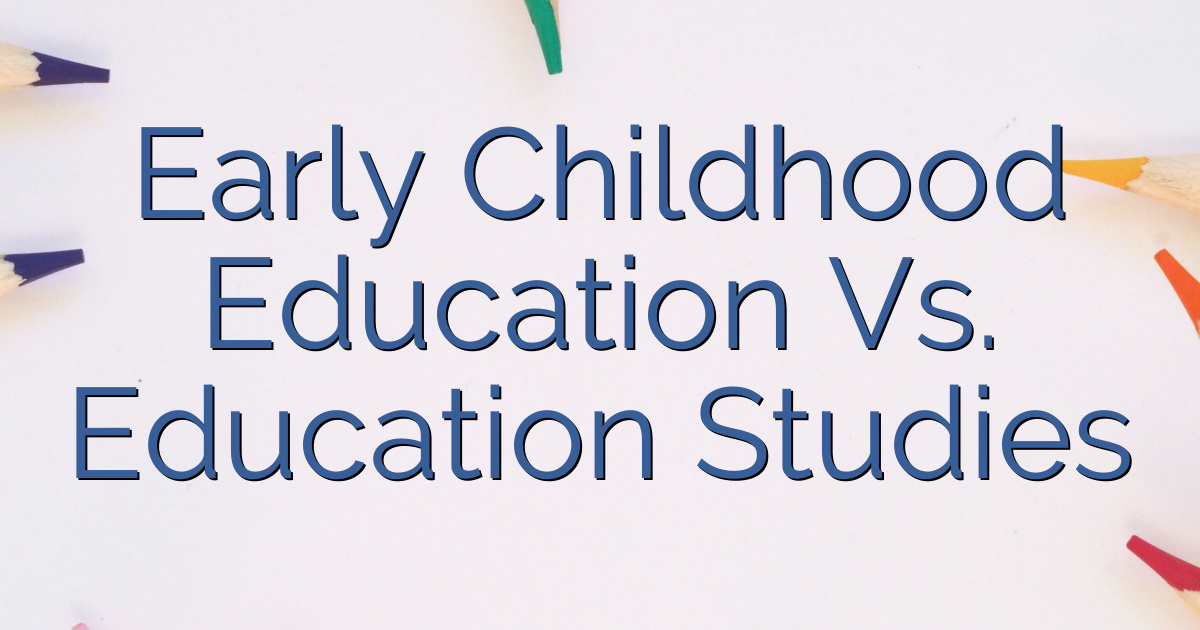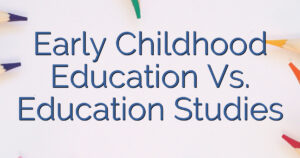 Are you torn between pursuing a degree in Early Childhood Education or Education Studies? Both majors offer unique opportunities for a rewarding career in the field of education.
In this article, we will delve into the specifics of each program, exploring their curricula, requirements, and the skills they develop. Additionally, we will compare the career opportunities and salary potential of these two majors, helping you make an informed decision.
So, if you’re ready to explore the world of education, let’s dive in.
Are you torn between pursuing a degree in Early Childhood Education or Education Studies? Both majors offer unique opportunities for a rewarding career in the field of education.
In this article, we will delve into the specifics of each program, exploring their curricula, requirements, and the skills they develop. Additionally, we will compare the career opportunities and salary potential of these two majors, helping you make an informed decision.
So, if you’re ready to explore the world of education, let’s dive in.
Table of Contents
Key Takeaways – Early Childhood Education Vs. Education Studies
- Early Childhood Education focuses on child development, curriculum planning, and teaching strategies for young children, while Education Studies delves into educational policy, administration, and research methods.
- Early Childhood Education provides a more focused approach, while Education Studies offers a broader understanding of the education system.
- Early Childhood Education involves direct interaction with young children and facilitating play-based learning, whereas Education Studies involves research, policy analysis, and program development to improve educational systems.
- Early Childhood Education skills are more directly applicable to teaching in early childhood settings, while Education Studies focuses more on theoretical and research aspects of education.
Overview of the two majors: Early Childhood Education and Education Studies
Early childhood education and education studies are two distinct majors that focus on different aspects of the field of education. In early childhood education, the program requirements typically include coursework in child development, curriculum planning, and teaching strategies specific to young children. Graduates of this program often go on to work as preschool teachers, kindergarten teachers, or child care center directors. On the other hand, education studies majors delve into broader aspects of education, including educational policy, administration, and research methods. They may pursue careers in educational research, policy analysis, or curriculum development. While both majors offer opportunities to work with children and contribute to the field of education, early childhood education provides a more focused approach, while education studies allows for a broader understanding of the education system as a whole.Overview of the curriculum and requirements of the two majors
The curriculum and requirements of the two majors, ECED and EDST, offer distinct paths for students interested in education. Here are the key differences in their curriculum:- ECED (Early Childhood Education) focuses on the development and education of children from birth to age 8. You will study courses like child psychology, early literacy, and curriculum development for young learners.
- EDST (Education Studies) provides a broader understanding of the field of education. You will explore topics such as educational policy, diversity in schools, and theories of learning.
Overview of coursework, assessments, and teaching practicum experiences
In ECED, you will have the opportunity to gain practical teaching experience through a variety of classroom practicum placements. This hands-on experience is essential in preparing you for a career in early childhood education. The coursework content in ECED focuses on child development, curriculum design, and assessment strategies. You will learn about the importance of creating engaging and developmentally appropriate environments for young children. Additionally, you will explore various teaching methods and strategies that promote positive learning outcomes. The teaching practicum placements allow you to apply your knowledge and skills in real classroom settings, under the guidance of experienced teachers. These placements provide valuable opportunities to observe, plan, and implement lessons, as well as to assess and reflect on your teaching practice. The quality of these practicum experiences is crucial in shaping your abilities as an effective early childhood educator.| Coursework Content | Teaching Practicum Quality |
|---|---|
| Child development | Supervised experience |
| Curriculum design | Supportive feedback |
| Assessment strategies | Professional guidance |
Comparison of Skills Developed in Early Childhood Education vs. Education Studies Programs
One key difference between the skills developed in ECED and education studies programs is the emphasis on hands-on teaching experience through practicum placements. In Early Childhood Education (ECED) programs, students are given the opportunity to apply their knowledge and theories in real classroom settings, working directly with young children. This hands-on experience allows them to develop essential skills such as lesson planning, classroom management, and individualized instruction. On the other hand, Education Studies programs focus more on the theoretical and research aspects of education. While students in these programs may also have some practical experience, it is typically less extensive compared to ECED programs. Instead, Education Studies students often gain skills in areas such as educational policy analysis, curriculum development, and research methodologies. Overall, the skills developed in ECED programs tend to be more directly applicable to teaching in early childhood settings, while Education Studies programs provide a broader understanding of education as a field.Comparison of Career Opportunities and Job Roles in Early Childhood Education vs. Education Studies Programs
When considering career opportunities, it’s important to note that job roles in ECED programs often involve direct interaction with young children, while job roles in education studies programs may involve more research and policy analysis. In early childhood education (ECED) programs, you can pursue a career as a preschool teacher, childcare provider, or early intervention specialist. These roles require hands-on work with children, creating lesson plans, facilitating play-based learning, and promoting social and emotional development. On the other hand, education studies programs can lead to careers as educational policy analysts, researchers, or curriculum developers. These roles focus on analyzing data, conducting research, and developing policies and programs to improve educational systems. Both ECED and education studies offer unique career opportunities, so it’s important to consider your interests and strengths when choosing the path that aligns with your career goals.Comparison of Salary Potential: Job Market Trends
Salaries for professionals in ECED programs tend to be lower compared to those in education studies programs. However, it is important to consider the job outlook and salary growth in these fields. According to recent research, the job outlook for early childhood educators is quite positive. With an increasing demand for quality early childhood education, the need for qualified professionals is expected to grow. This can lead to a higher demand for ECED professionals in the job market, potentially resulting in better salary growth over time. On the other hand, the job outlook for individuals in education studies programs varies depending on the specific area of focus. While some education studies graduates may find lucrative opportunities, others may face challenges in finding well-paying positions. Therefore, it is crucial to carefully evaluate the job market trends and potential salary growth when considering a career in either field.Similarities between Early Childhood Education and Education Studies
Both ECED programs and education studies programs share a common focus on preparing individuals for careers in the field of teaching. Both programs provide students with a strong foundation in teaching techniques and strategies that are essential for effective instruction. In addition, both programs also emphasize the importance of understanding developmental psychology in order to meet the unique needs of young learners. In ECED programs, students learn specific teaching techniques that are tailored to the developmental stages of young children. They learn how to create engaging and age-appropriate lesson plans, how to effectively manage a classroom, and how to assess and evaluate student progress. Education studies programs, on the other hand, provide a broader understanding of teaching and learning theories. Students in these programs explore various teaching methods and approaches, and also gain knowledge about curriculum development and assessment practices.Difference between Early Childhood Education and Education Studies majors
If you’re deciding between majors, it’s important to understand the differences between Early Childhood Education and Education Studies. While both majors focus on education, they differ in terms of job prospects and salary potential. Early Childhood Education prepares you to work specifically with young children, typically from birth to age eight. With this major, you can pursue careers as a preschool teacher, kindergarten teacher, or early intervention specialist. The demand for early childhood educators is expected to grow in the coming years, with job opportunities available in public and private schools, childcare centers, and government agencies. However, it’s important to note that the salary potential for early childhood educators is often lower compared to other education-related fields. On the other hand, Education Studies provides a broader understanding of education as a whole. This major allows you to explore various aspects of education, such as curriculum development, educational psychology, and educational policy. With an Education Studies degree, you can pursue careers in educational administration, curriculum design, or educational consulting. The job prospects for Education Studies graduates are diverse, with opportunities in schools, nonprofit organizations, and government agencies. Additionally, the salary potential for individuals with an Education Studies degree can be higher compared to those in early childhood education.Factors to consider when choosing between the two majors: specialization
When deciding between the two majors, it’s important to consider the area of specialization that aligns with your career goals. Both early childhood education and education studies offer different specialization options that can impact your job prospects. In early childhood education, you can specialize in areas such as special education, curriculum development, or administration. These specializations can lead to careers as special education teachers, curriculum specialists, or program administrators. On the other hand, education studies allow for specializations like educational policy, research, or instructional technology. These specializations can open doors to careers in policy analysis, educational research, or instructional design. It is crucial to research and understand the job prospects in the specific specialization you are interested in, as this will help you make an informed decision about which major aligns best with your career goals.How Does Understanding Child Psychology Benefit Early Childhood Education?
Understanding child psychology is crucial in education and child psychology. It helps teachers create effective learning environments that cater to the individual needs of each child. By understanding the cognitive, emotional, and social development of children, educators can promote positive learning experiences, leading to better overall education outcomes.

